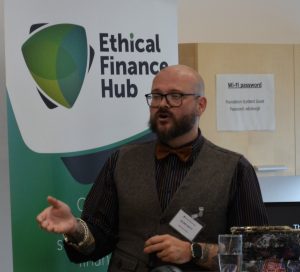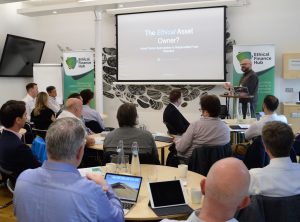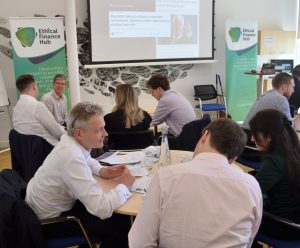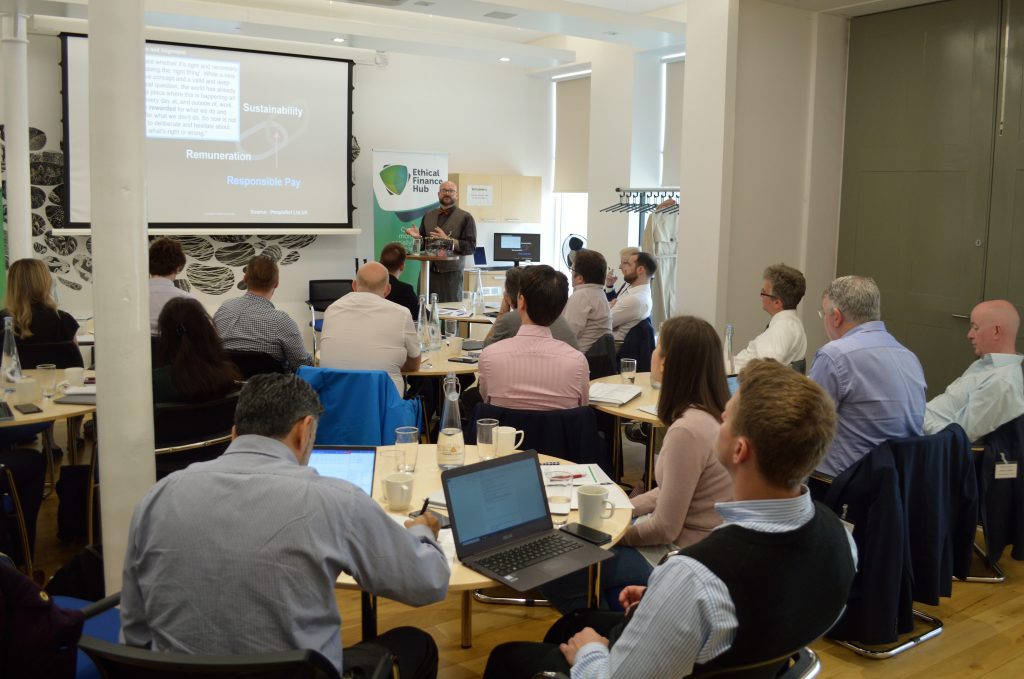 Former Scottish Widows fund selector Jon “JB” Beckett delivered the EFH’s latest masterclass that looked at “Asset Owner Approaches to Responsible Fund Selection.” The one day course took place at Foundation Scotland in Edinburgh on Wednesday 20th June 2019.
Former Scottish Widows fund selector Jon “JB” Beckett delivered the EFH’s latest masterclass that looked at “Asset Owner Approaches to Responsible Fund Selection.” The one day course took place at Foundation Scotland in Edinburgh on Wednesday 20th June 2019.
Having led the Responsible Investing Framework for Scottish Widows’ £189bn platform the 20 plus delegates were able to get an exclusive insight into the mindset of an institutional investor.
Background
In a recent Morgan Stanley survey of institutional investors, 70% said they are integrating sustainable investing into their investment process, signalling just how quickly the environmental, social and governance (ESG) imperative is catching on. Despite this the ESG narrative is dominated by asset managers and NGOs. The EFH team felt that it was important to provide a perspective of the often unheard, yet highly influential, asset owner.
Asset owners - pension funds, endowments, foundations and other large institutional investors - are embracing sustainable investing and viewing ESG factors as a way to proactively manage risk and returns. Of the $22.8 trillion invested sustainably, or $1 in every $4 under professional management, institutional investors own nearly 75% (Global Sustainable Investment Review 2016).
The Masterclass
The masterclass was an opportunity for JB to share practical experiences, case studies and discuss the problems in creating policy, dealing with key issues, persuading colleagues and decision makers and implementing fund manager selection, appointment and monitoring.
“There is no such thing as good.. it is merely the herding instinct of the individual.” Nietzsche
The course kicked off with a module exploring the backdrop to ethical investing and ESG with a focus on the responsibilities as investors, asset owners and, in turn, fund selectors. This session disentangled the myriad of theories, regulations, political narratives, fiduciary duties and other existential drivers that contrive to force and / or influence asset owners to interpret, understand and react to risk.
The second module focused on selection, appointment and monitoring frameworks and how asset owners can engage asset managers to assess ESG integration, how to deal with controversies, proxy voting and to open up a dialogue to gather information on stewardship and metrics like carbon foot printing and analytical short cuts like ESG fund ratings. It also covered the basics of fund manager selection to deliver to a responsible investment mandate.
 Delegates worked in teams to develop a plan of action in relation to a tobacco stock. A scenario was provided along with a range of additional documents and performance figures and delegates had to work in groups to decide whether to create a Tobacco policy and does that policy invest, divest, tilt or engage Tobacco companies from your portfolio. It was a very interesting exercise which, to the surprise of delegates, was more difficult than initially expected.
Delegates worked in teams to develop a plan of action in relation to a tobacco stock. A scenario was provided along with a range of additional documents and performance figures and delegates had to work in groups to decide whether to create a Tobacco policy and does that policy invest, divest, tilt or engage Tobacco companies from your portfolio. It was a very interesting exercise which, to the surprise of delegates, was more difficult than initially expected.
“If you think in terms of a year, plant a seed; if in terms of ten years, plant trees; if in terms of 100 years, teach the people.” Confucius
The third module looked at applying SAM frameworks into assessing specific asset classes (Growth Equity strategies, Value Equity strategies, Fixed Income strategies, Property and Infrastructure funds, Multi Asset funds and Green Finance and Impact). It was apparent that there cannot be an ‘one size fits all’ approach to different asset classes. This was brought to life through a series of powerful video case studies where delegates were invited by JB to not only consider the topic in question but how your personal views, as an asset owner, can lead to tipping points. To know and assess asset managers needs first for the asset owner to understand themselves.
The final module considered the role of UNDP Sustainable Development Goals or SDGs in Responsible investing frameworks, either as a central goal or pillar or supplementary to existing ESG, Ethical or Socially Responsible approaches. This explored why and how to introduce SDGs into policies and SAM frameworks.
Participant Feedback
“Really enjoyed the event today a real Master Class!”
“An excellent event with interesting people attending.”
“The Masterclass was well-organised with interesting, topical and engaging material, with a good mix of participants.”

0 Comments
Leave A Comment